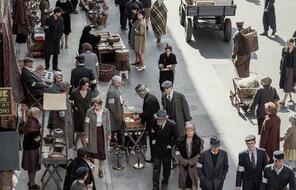The "New Germany" on the Olympic Stage
At a Glance
Language
English — USSubject
- History
- The Holocaust
In August 1936, Germany hosted the summer Olympic Games. The international event gave the Nazis a chance to show the world the “new Germany,” and they took full advantage of the moment. To prevent criticism from foreigners, the signs that read “No Jews Allowed” were taken down and Germans were warned to be respectful of visitors regardless of their “race.”
Americans Charles and Anne Lindbergh were among the visitors to the Olympics. He was a world-famous aviator, the first to fly solo nonstop between the United States and France; she was a noted author. The Nazis welcomed the couple with tours of German aircraft facilities and dinners with top officials. In a letter to her mother, Anne described the “shock of seeing in person” the bias in “the strictly puritanical view at home that dictatorships of necessity are wrong, evil, unstable, and no good can come of them, combined with the funny-paper view of Hitler as a clown.” She wrote: “In truth, there is no question of the power, unity, and purposefulness of Germany. It is terrific. I have never in my life been so conscious of such a directed force. It is thrilling when seen manifested in the energy, pride, and morale of the people—especially the young people.” 1
And yet Anne Lindbergh did have some reservations. The unity she admired was in the hands of one man. And she also pointed out a number of things she disliked about the new Germany, including “their treatment of the Jews” and “their brute-force manner.” But on the whole, she insisted that Germany could be “a force for good in the world” if only the world would accept Germany’s new rulers so they could turn “in the right direction.” 2
For the Nazis, the Olympics also presented an opportunity to show the superiority of the “Aryan” race. German athletes won medal after medal at the Olympics. And yet the most admired athlete that year was not a German but an African American. Max von der Grün, who was ten years old that summer, recalled:
Although it was drummed into our heads every day that anything or anyone non-German was completely worthless, a black man became our idol. . . . In the playing field we used to play at being Jesse Owens; whoever could jump the farthest or run the fastest or throw some object the greatest distance became Jesse Owens.
When our teachers heard us, they forbade us to play such games, but they never replied to our question of how a black man, a member of an “inferior” race, could manage to be such a consummate athlete. 3
Marion Freyer Wolff was also ten that summer. As a Jew living in Berlin, she was particularly struck by the changes the Olympics brought to Germany:
Hitler was so eager to have them in Germany that he was willing to make some minor compromises: stores and restaurants removed their We Don’t Serve Jews signs for the duration of the event, and Jewish athletes participated in the games. Three Jewish women, representing Hungary, Germany, and Austria, won medals in fencing and received them from the hand of Hitler himself! . . .
The success of the Jewish athletes received no notice in the German press, but nobody could hide the fact that Jesse Owens, the black American sprinter, had earned four gold medals. I wondered how Hitler, who fancied himself a member of the super race, must have felt when he met this “inferior” non-Aryan again and again in the winner’s circle. To the Jewish kids of Berlin, Jesse Owens became an instant idol and morale booster. 4
Connection Questions
- Why do you think Hitler wanted the 1936 Olympics to be in Germany?
- Why do you think the Nazis removed some signs during the Olympics? What does that imply about their concern for public opinion? Why would Germany have been sensitive to how other countries felt about their treatment of Jews?
- How did the Lindberghs respond to what they saw in Germany? What was visible to them? What was not visible?
- There were debates in some countries—including the United States, Great Britain, France, Czechoslovakia, Sweden, and Denmark—about possibly boycotting the Olympics, but in the end all of those countries sent teams. By 1936, Nazi ideology and racial policy were clear to the world. Based on that fact, do you think these countries should have boycotted the games? What difference might that have made?
- 1Quoted in Andrew Nagorski, Hitlerland: American Eyewitnesses to the Nazi Rise to Power (New York: Simon & Schuster, 2012), 206.
- 2Quoted in Andrew Nagorski, Hitlerland: American Eyewitnesses to the Nazi Rise to Power (New York: Simon & Schuster, 2012), 206.
- 3Max von der Grün, Howl Like the Wolves: Growing Up in Nazi Germany, trans. Jan van Heurck (New York: William Morrow, 1980), 107.
- 4Marion Freyer Wolff, The Shrinking Circle: Memories of Nazi Berlin, 1933–1939 (UAHC Press, 1989), 21.
How to Cite This Reading
Facing History & Ourselves, "The "New Germany" on the Olympic Stage," last updated August 2, 2016.








